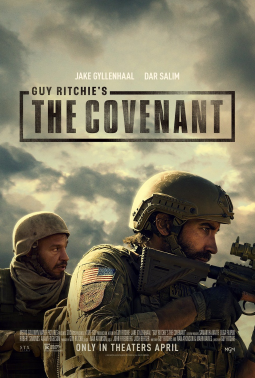“Image of Victory” is an Israeli movie directed by Avi Nesher. It is based on the Battle of Nitzanim in the Israel War of Independence. It was nominated for 15 Ophir Awards (the Israeli equivalent of the Oscars). It won for Cinematography, Make-up, and Costume Design.
The movie leads with the Camp David Accord, which causes a Palestinian journalist named Hassanin (Amir Khoury) to wonder what they fought for in 1948. Flash back to 1947. The movie has dual tracks. One follows Hassanin (Amir Khoury) as he embeds with Egyptian volunteers when they join with Palestinian Arabs living in a village close to Nitzanim. They train for an attack on the kibbutz. It should be a piece of cake. Hassanin narrates his half of the movie. The other track focuses on the Israeli’s living in the kibbutz. They are prepared to defend themselves, but the settlers are all amateurs. They are reinforced by a unit of soldiers, some of whom are convicts. The Israelis know an attack is coming and they prepare for it. Even some of the women will participate in the defense. The kibbutz scenes concentrate on Mira (Joy Reiger). She is a bad-ass. When most of the women and all the children are evacuated, she stays to fight.
The movie has a romance between Mira and the Israeli commander Avraham Schwarzstein (Yadin Gellman), but it is cursory. There are tit-for-tat ambushes before the war even begins. The war breaks out after Israel declares independence. The kibbutz must be held for political reasons. That’s the official reason, but an evil political officer thinks losing the kibbutz won’t be too bad. The settlers will be martyrs. At first, taking the kibbutz looks possible. However, the force in the village shows itself to be incompetent. The kibbutz looks like it will be held. Unfortunately, an Egyptian unit that passes by on the way to Tel Aviv, gets its butt whipped. To save face, it needs to have a victory before returning to Egypt. The kibbutz will be their target.
The film intends to be fair to both sides, but it is actually about 70% in the kibbutz. This reflects the fact that it was made by Israelis. It is a tribute to the defenders of Kibbutz Nitzanim, especially the women. Mira represents all the Israeli women who fought for Israel’s independence. Mira is a great character. We don’t see many strong women in war movies. She not only fights. She is a rock among the amateur kibbutz members. Mira is not the only woman who fights. They look to her as their unofficial leader. Hassanin reflects the Arab point of view. He is overconfident about the success of the soldiers he and his cameraman are covering. He mentions wanting to be like Frank Capra. He is your typical cinematic reporter. Hassanin is willing to be shot at to get his story. That story is supposed to highlight the great victory of the Arabs. Hassanin does want to cover the battle realistically, but his boss expects a puff piece highlighting the courageous Egyptians We don’t see his finished project, but it is safe to assume it makes the battle into a great victory. The documentary will be an “image of victory”. The Israeli movie “Image of Victory” could have been propaganda, too. Instead, the movie is fairly even-handed. Of course it makes the kibbutz defenders to be heroic. But it doesn’t sugarcoat the fact that the battle was a losing effort. The Arab irregulars are also sympathetically portrayed.
The movie is well-made. The acting is stellar, especially by Joy Reiger. The dual track format was a wise decision. We see both sides of the battle. However, the movie is too micro. We do not learn what the Arabs are fighting for. We have no perception of what is going on in the war outside of the kibbutz. We do know that although Kibbutz Nitzanim falls, the new Israeli nation will be a tough cookie. The kibbutz stands in for the Israeli nation that was surrounded by hostile forces. But unlike the kibbutz, the nation was not conquered in any of its wars.
The story was originally not looked on as heroic. The surrender of the kibbutz was one of the few surrenders in the war. Many Israelis felt the kibbutz should have fought to the end. In the years since, that perception has changed and the Battle of Nitzanim is now considered a valorous event similar to the Alamo. The movie certainly buys into the current narrative. The Kibbutz was established by farming families that included Holocaust survivors. It had two problems: the land was poor for farming and the settlement was isolated and surrounded by Arab villages. It was not an easily defensible position. There was some skirmishing before the war, as portrayed in the movie. The Israelis consisted of 74 soldiers and 67 settlers. On the night of June 6, 1948, the Battle of Nitzanim began with artillery fire. Several Arab irregulars attacks were repulsed. After an Egyptian unit was unsuccessful in its drive to Tel Aviv, the mission was switched to taking the kibbutz. It called in aerial bombardment and then followed it with artillery, armor, and infantry. The defenders were able to take out some tanks, but the leader, Schwarzstein, was forced to fall back to more central perimeters twice. It was decided they had no choice but to surrender. When Schwarazstein and Ben-Ari went out to negotiate, an Egyptian officer shot Schwarzstein resulting in Ben-Ari killing him and then being killed himself. Cooler heads then prevailed and the surrender was agreed to. 33 Israelis were dead, 16 were kibbutzers (3 were women). 105 were captured.
GRADE = B+

.jpg)